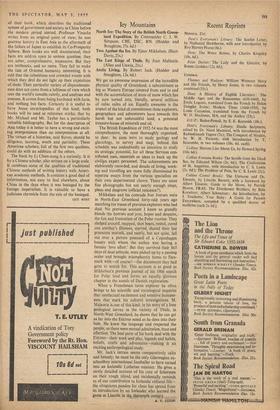Icy Mountains
The Last Kings of Thule. By Jean Malaurie. (Allen and Unwin, 21s.) WE get an awesome impression of the incredible physical quality of Greenland; a subcontinent as big as Western Europe covered from end to end with the accumulation of aeons of snow which has by now turned into, literally, several millions of cubic miles of ice. Equally awesome is the impact of the kind of commitment these explorers, geographers and adventurers have towards this harsh but not unbeautiful land, a potential treasure-house of minerals and oil.
The British Expedition of 1952-54 was the most comprehensive, the most thoroughly organised, to date : its aims were to study geology and glaciology, to survey and map; behind this schedule was undoubtedly an intention to study its strategic potential, for all three Services con- tributed men, materials or ideas to back up the civilian expert personnel. The achievements are elaborately recorded, and details of living, work- ing and travelling are more fully illuminated by separate essays from the various specialists on their own departmental chores. There are some fine photographs but not nearly enough maps, plans and diagrams (official reticence?).
Mikkelsen and his comrade Iver Iversen were in North-East Greenland forty-odd years ago searching for traces of previous explorers who had died. No previous account I know so grandly blends the horrors and joys, hopes and despairs, the fun and frustration of the Polar routine. They sledged around, mapped, shot bears, rested, cured one another's illnesses, starved, shared their last gruesome morsels, and nearly, but not quite, fell out over a picture postcard of a Copenhagen beauty with whom the author was having .a fantasy 'love affair.' But they survived their 865 days of dual solitude, were picked up by a passing sealer and brought triumphantly home to Den- mark with—of course !—the documents they had gone to search for. This account is as good as Mikkelsen's previous journal of his 1906 search for Polar land and forms an equally glorious chapter in the annals of Danish exploration.
When a Frenchman turns explorer he often brings to his scientific and sociological inquiries that intellectual excitement and sensitive humane- ness that 'mark his cultural investigations. M. Malaurie is one of this kind; in his story of a lone geological survey in the vicinity of Thule, in North-West Greenland, he shows that he can get as far into the Eskimo mind as he does into their huts. He knew the language and respected the people, so there were mutual admiration, trust and affection. The best parts of his book deal with the Eskimo—their work and play, legends and habits, beliefs, crafts and adventures—making it an exciting anthropological study.
Mr. Jack's terrain seems comparatively calm and homely; he must be the only Glaswegian ex- schoolboy international footballer to have turned into an Icelandic Lutheran minister, He gives a nicely detailed account of his cure of fishermen on their rough island, and incidentally reminds us of our contribution to Icelandic cultural life— the ubiquitous passion for chess has spread from its introduction by an Icelanderwho learned the game at Lincoln in the, thirteepth cent,W,Y.,101
• A. V. COTON










































 Previous page
Previous page